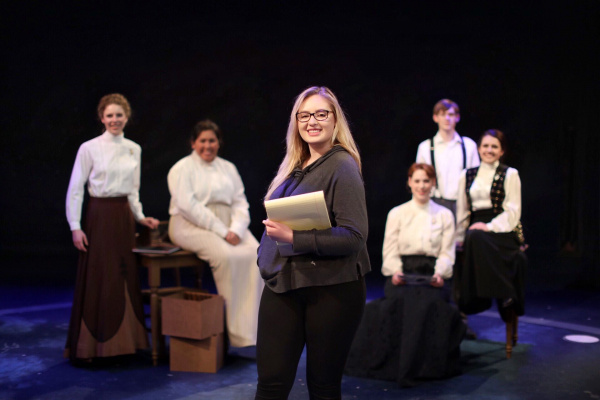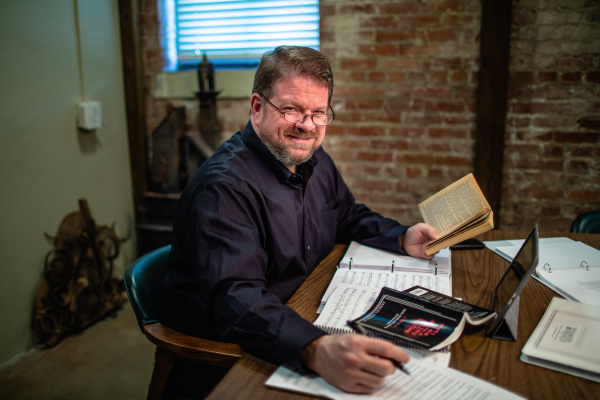Chronic pain is not often discussed. Those with chronic conditions feel that if they do discuss the daily pain they face, they come across as complaining (and others may say things along those lines). Yet if they don’t mention it, no one knows they are in pain. Two students working toward their master of arts in theatre are opening the conversation with their thesis project.
Harrison Miller will be the director and Beth Adkins is the stage manager and technical director for Philoctetes: A Cry of Suffering. Showtime is 7:30 p.m. March 5–7 at Performance Hall. Tickets can be purchased online or by calling Program & Productions at (864) 770-1372.
A Purposeful Choice
Both Miller and Adkins were attracted to the translations of Bryan Doerries, who studies the cultural context of the plays that he translates and considers what purpose the author may have had.
“We read a part of a book that he wrote about why he does what he does called Theater of War,” said Miller. “He postulated that plays like Philoctetes and also Ajax and Prometheus Bound and The Women of Trachis, among many others—they served more specific purposes than we think. So, his postulation was that Philoctetes was a play that was done for military veterans who were suffering from chronic pain, from pain that doesn’t go away. And he sees how that still relates today (because) we have an enormous amount of soldiers who come back who can be saved from death but who cannot actually be saved from their pain… . And that is the group that he does his work for. He does his work for veterans.”
Miller stated that he wanted to do something similar to what Doerries is doing, but he and Adkins needed to find something that applied to their audience: the BJU community. “We decided (on) the play Philoctetes because it’s about chronic pain and chronic illness (and) we have students who deal with that. We have faculty and staff who deal with that.”
See Also: Chronically Ill, Faithfully Living | My Savior First of All: A Story of Faith
A Humbling Lesson
Miller also said that he has learned much from studying the play. “What (Philoctetes) has come to mean to me is that I have to humble myself,” he said. “Because, you know, when you choose a play and you direct it, you become the leader of the thought. But I have to humble myself before the thought, when what the play is saying is not what I want to say.”
Miller made choices not to change anything Philoctetes says or does in his suffering to make his audience more comfortable. “What Philoctetes says is really hard. He does not turn those who are chronically ill into Christian martyrs. … Philoctetes is a very real person who has very real human reactions to his pain,” he said. “(Doerries) quoted this from an officer who said it to him, I can’t remember where it comes from originally, he said that this theatre is good because it comforts the afflicted and afflicts the comfortable. So, I have learned that I need to be afflicted by this text.”
A Burning Question
The lesson that Miller, Adkins and their cast and crew have learned through this play has led them to ask the audience a question in return: Will you stay?
In the play, Philoctetes is abandoned by his comrades because of his chronic pain. He is left alone on a deserted island for 10 years. Philoctetes’s isolation in the play symbolizes the isolation those who suffer from chronic illness face, whether they choose to isolate themselves or their friends and loved ones leave.
In the middle of the play, one of the characters is faced with a decision. Will he stay and comfort Philoctetes, or will he also abandon him?
“I hope that (the audience takes) the time to think and to not just remember the ending of the play, but to remember the middle, which is the worst part,” said Miller. “And they remember that that’s very real, and that they have a responsibility to be willing to stay for that. That’s our hashtag, our question. Will you stay? So what I hope they take from (the play) is that this is a really important issue that affects a lot of people, even if they don’t see it, even if that person isolates themselves or is isolated because of a lack of people who are willing to put up with them. It’s very real, and we have an obligation to listen to their stories and to seek them out.”








